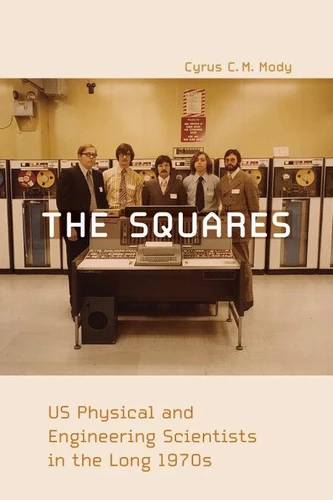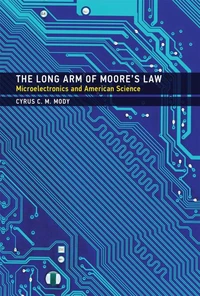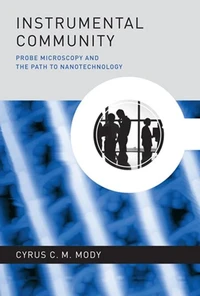The Squares. US Physical and Engineering Scientists in the Long 1970s
Par :Formats :
Disponible dans votre compte client Decitre ou Furet du Nord dès validation de votre commande. Le format ePub protégé est :
- Compatible avec une lecture sur My Vivlio (smartphone, tablette, ordinateur)
- Compatible avec une lecture sur liseuses Vivlio
- Pour les liseuses autres que Vivlio, vous devez utiliser le logiciel Adobe Digital Edition. Non compatible avec la lecture sur les liseuses Kindle, Remarkable et Sony
- Non compatible avec un achat hors France métropolitaine
 , qui est-ce ?
, qui est-ce ?Notre partenaire de plateforme de lecture numérique où vous retrouverez l'ensemble de vos ebooks gratuitement
Pour en savoir plus sur nos ebooks, consultez notre aide en ligne ici
- Nombre de pages422
- FormatePub
- ISBN978-0-262-36935-0
- EAN9780262369350
- Date de parution12/07/2022
- Protection num.Adobe DRM
- Taille1 Mo
- Infos supplémentairesepub
- ÉditeurThe MIT Press
Résumé
When ungroovy scientists did groovy science: how non-activist scientists and engineers adapted their work to a rapidly changing social and political landscape. In The Squares, Cyrus Mody shows how, between the late 1960s and the early 1980s, some scientists and engineers who did not consider themselves activists, New Leftists, or members of the counterculture accommodated their work to the rapidly changing social and political landscape of the time.
These "square scientists, " Mody shows, began to do many of the things that the counterculture urged: turn away from military-industrial funding, become more interdisciplinary, and focus their research on solving problems of civil society. During the period Mody calls "the long 1970s, " ungroovy scientists were doing groovy science. Mody offers a series of case studies of some of these collective efforts by non-activist scientists to use their technical knowledge for the good of society.
He considers the region around Santa Barbara and the interplay of public universities, think tanks, established firms, new companies, philanthropies, and social movement organizations. He looks at Stanford University's transition from Cold War science to commercialized technoscience; NASA's search for a post-Apollo mission; the unsuccessful foray into solar energy by Nobel laureate Jack Kilby; the "civilianization" of the US semiconductor industry; and systems engineer Arthur D.
Hall's ill-fated promotion of automated agriculture.
These "square scientists, " Mody shows, began to do many of the things that the counterculture urged: turn away from military-industrial funding, become more interdisciplinary, and focus their research on solving problems of civil society. During the period Mody calls "the long 1970s, " ungroovy scientists were doing groovy science. Mody offers a series of case studies of some of these collective efforts by non-activist scientists to use their technical knowledge for the good of society.
He considers the region around Santa Barbara and the interplay of public universities, think tanks, established firms, new companies, philanthropies, and social movement organizations. He looks at Stanford University's transition from Cold War science to commercialized technoscience; NASA's search for a post-Apollo mission; the unsuccessful foray into solar energy by Nobel laureate Jack Kilby; the "civilianization" of the US semiconductor industry; and systems engineer Arthur D.
Hall's ill-fated promotion of automated agriculture.
When ungroovy scientists did groovy science: how non-activist scientists and engineers adapted their work to a rapidly changing social and political landscape. In The Squares, Cyrus Mody shows how, between the late 1960s and the early 1980s, some scientists and engineers who did not consider themselves activists, New Leftists, or members of the counterculture accommodated their work to the rapidly changing social and political landscape of the time.
These "square scientists, " Mody shows, began to do many of the things that the counterculture urged: turn away from military-industrial funding, become more interdisciplinary, and focus their research on solving problems of civil society. During the period Mody calls "the long 1970s, " ungroovy scientists were doing groovy science. Mody offers a series of case studies of some of these collective efforts by non-activist scientists to use their technical knowledge for the good of society.
He considers the region around Santa Barbara and the interplay of public universities, think tanks, established firms, new companies, philanthropies, and social movement organizations. He looks at Stanford University's transition from Cold War science to commercialized technoscience; NASA's search for a post-Apollo mission; the unsuccessful foray into solar energy by Nobel laureate Jack Kilby; the "civilianization" of the US semiconductor industry; and systems engineer Arthur D.
Hall's ill-fated promotion of automated agriculture.
These "square scientists, " Mody shows, began to do many of the things that the counterculture urged: turn away from military-industrial funding, become more interdisciplinary, and focus their research on solving problems of civil society. During the period Mody calls "the long 1970s, " ungroovy scientists were doing groovy science. Mody offers a series of case studies of some of these collective efforts by non-activist scientists to use their technical knowledge for the good of society.
He considers the region around Santa Barbara and the interplay of public universities, think tanks, established firms, new companies, philanthropies, and social movement organizations. He looks at Stanford University's transition from Cold War science to commercialized technoscience; NASA's search for a post-Apollo mission; the unsuccessful foray into solar energy by Nobel laureate Jack Kilby; the "civilianization" of the US semiconductor industry; and systems engineer Arthur D.
Hall's ill-fated promotion of automated agriculture.





